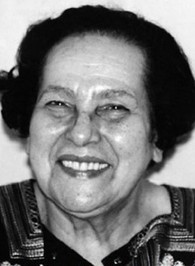Latifa Al-Zayyat (1923-1996) ( لطيفة الزيات), Egyptian writer and political activist born in Damietta. She received a B.A. in English literature from Cairo University in 1946 and a Ph.D. from the same institution in 1957. She was a professor of English literature and criticism at the Girls' College at Ain Shams University from 1952 until her death.
She was the director of the Arts Academy and a member of the Supreme Council for Arts and Humanities. She published many works on politics, literary criticism, and creation in the novel, the short story, autobiography, and drama. She also published several translations and studies in English. She was a leader of the National Committee of Students and Workers in the 1940s. Her political activity led to her arrest on more than one occasion. She was the president of the Committee to Defend National Culture from 1979 until her death.
She was arrested in 1981 as part of a state campaign against intellectuals and writers. She was a member of the Council for World Peace and an honorary member of the General Union of Palestinian Writers and Journalists. She was awarded the State Medal of Appreciation in humanities in 1996, only a few months before her death. She translated Maynard Solomon's Marxism and Art (New York: Vintage Books, 1973) as Hawi ai-fann: ru'ya Marksiya, published 1994.
She published influential works in the fields of critical theory and literary criticism, especially dealing with the image of women in Arabic novels. In addition, she is a distinguished novelist who wrote a seminal novel in 1960 called The Open Door الباب المفتوح which was also produced into a film starring Faten Hamama in 1963. About this novel, Latifa Al-Zayyat said: “in the novel, I aimed at crystallizing three levels of significance. The first one deals with the development of the female protagonist, and its related to the second which deals with developments in Egypt at that period.
As for the third level, it incorporates a commentary on the values of the middle class and its practices and how they prevent the country from a take off. The Open Door (الباب المفتوح) has also been an inspiration for a large number of Arab women who seek to challenge the status quo for women in the Arab world and achieve some sort of change. There is a famous blog based on the main character in the novel called كلنا ليلى (http://kolenalaila.com) which is a collection of blog entries written by Arab women who seek to change their situation.
Publications: (Arabic)
Fiction:
ai-Bab ai-maftuh (The Open Door, novel). Cairo: Anglo Library, 1960.
ai-Shaykhukha wa qisas ukhra (Old Age and Other Stories, short stories). Cairo: Dar al-Mustaqbal al-'Arabi, 1986.
Hamiat taftish: awraq shakhsiya (The Search: Personai Papers, memoir). Cairo: Dar al-Hilal, 1992.
Bi' wa shira' (Buying and Selling, play). Cairo: General Egyptian Book Organization, 1994.
Sahib ai-bayt (The Owner of the House, novel). Cairo: Dar al-Hilal, 1994.
ai-Riljui alathi 'arafa tuhmatah (The Man Who Knew His Charge, short stories). Cairo: Dar Sharqiyat, 1995.
Non-Fiction:
Najib Mahfllz: ai-sura wa-i-mithai (Naguib Mahfouz: Image and Parable, 1989)
Suwar ai-mar'a fi-i-qisas wa-i-riwayat al-'Arabiya (Images of Women in Arabic Short Stories and Novels, 1989, critical study)
Adwa' (Lights, 1995, essays on literary criticism), and Furd Maduks Furd wa-i-hadatha (Ford Madox Ford and Modernity, 1996).
(Translated from Arabic to English)
The Search: Personal Papers, translated by Sophie Bennett. London: Quartet Books, 1996
The Owner of the House, translated by Sophie Bennett. London: Quartet Books, 1996
The Open Door, translated by Marilyn Booth. Cairo: American University in Cairo Press, 2000
Source: Arab Women Writers



